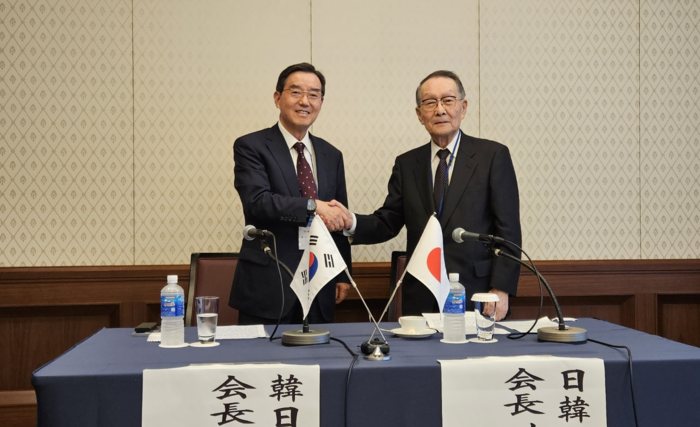Korean and Japanese Business Leaders Meet to Strengthen Ties, Local Leaders Rising in DPK
Korea-Japan Business Conference Held in Tokyo, Former Local Government Leaders Rise in the Democratic Party, International Effort Yields Arrests in Brutal Pattaya Murder Case

Korea-Japan Business Conference Held in Tokyo
The 56th Korea-Japan Business Conference, a key private-sector forum for economic cooperation, was held at the Okura Hotel in Tokyo on May 14th. The conference, which brought together about 300 business leaders from both countries, was the first to be held in-person since 2019 due to disruptions caused by the COVID-19 pandemic.
Hosted jointly by the Korea-Japan Economic Association and the Japan-Korea Economic Association, the meeting took place under the theme of "Korea-Japan Partnership Leading to the Future." It comes at a time when relations between the two countries have been improving but still face challenges due to unresolved historical and territorial disputes.
In his keynote speech, Chey Tae-won, the chairman of SK Group and the Korea Chamber of Commerce and Industry, proposed establishing a platform to study specific opportunities for Korea-Japan economic cooperation. He emphasized that the two countries face common challenges and could generate significant synergies by working together.
"Let's restore trust between the two countries through joint business projects," Chey said. "Korea and Japan have common challenges facing them, and there can be synergy effects when cooperating economically."
Kim Yoon, the chairman of Samyang Holdings and the Korea-Japan Business Conference, echoed this sentiment in his opening remarks. He stressed the need for fair competition and cooperation between Korean and Japanese firms, arguing that close collaboration is not just an option but a necessity given the global crises and uncertainties.
"Considering the global crisis and uncertain conditions we face, close cooperation between Korea and Japan is no longer an option but a necessity," Kim said. "Economic cooperation related to the supply chain between the two countries is most important."
On the Japanese side, Sasaki Mikio, the chairman of the Japan-Korea Economic Association and former chairman of Mitsubishi Corporation, focused on the need to reconstruct global supply chains in light of recent geopolitical conflicts and disruptions.
He explained that events like the Russia-Ukraine war, the Israel-Hamas conflict, and the spike in global energy prices and inflation are forcing companies to re-examine the location of their production bases and build more resilient supply chains. In this context, he argued, Korea and Japan need to work together more closely than ever.
"Division and confrontation are spreading to the economy, and from the perspective of economic security, it is inevitable to re-examine the location of corporate production bases and reconstruct the global supply chain," Sasaki said. "In an era of division and confrontation, it is not easy for a single country to respond alone, and connection and cooperation are more important than ever."
While acknowledging the unresolved historical and territorial issues between the two countries, Sasaki emphasized the strong interdependence between Korean and Japanese businesses. "Korean and Japanese business leaders well know that they need each other, and the better they get along, the more helpful it will be," he said.
The business leaders discussed several potential areas where Korea and Japan could deepen economic cooperation, despite the complex geopolitical environment marked by US-China tensions and domestic political pressures.
In the semiconductor sector, they expressed a desire to work together to build resilient supply chains, even as the US pushes for "decoupling" and restricts some technology sharing. Digital transformation projects in fields like AI, 5G, the Internet of Things, and smart factories were also seen as promising areas for joint work.
Developing the supply chains and standards for the hydrogen economy and supporting Korean and Japanese startups to enter each other's markets were other ideas put forward. More broadly, the participants agreed on the need to use expanded business ties to improve mutual understanding and perceptions between the two countries.
To translate these visions into reality, the business leaders recognized the need to convince both governments to provide more policy support for Korea-Japan cooperation. They also committed to implementing concrete joint projects that go beyond high-level meetings and MOUs.
The upcoming Korea-China-Japan summit, set to be held in Seoul on May 26-27, is the next important opportunity for the countries to solidify the momentum for improved ties.
Former Local Government Leaders Rise in the Democratic Party
The recent general election in April brought a new class of lawmakers to the National Assembly, including a notable contingent of former mayors, governors, and local council members in the Democratic Party. Out of the party's 171 seats, 17 are now held by people with local government leadership experience, accounting for about 10% of the total.